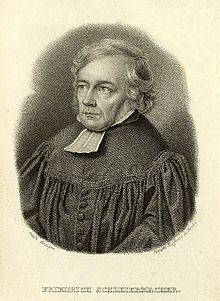Bible Knowledge Graph
Friedrich Schleiermacher
- Entity ID:
- friedrich-schleiermacher
- Long Name:
- Schleiermacher, Friedrich, 1768-1834
- Short Name:
- Friedrich Schleiermacher
- Disambiguation String:
- German theologian and philospher
- Entity Type:
- person
- Entity Subtype:
- author
-

- Wikipedia
- Summary:
-
Friedrich Daniel Ernst Schleiermacher was born on November 21, 1768, in Breslau, Lower Silesia (now Wroclaw, Poland). Despite his being the son of a Reformed clergyman, Schleiermacher studied under the Moravian Brethren (Herrnhuters), gaining from them an appreciation for the Latin and Greek classics and a strong sense of religious life. He found the teaching of the Herrnhuters too restrictive, however, because the faculty refused to lecture on current intellectual trends. In 1787 he entered the University of Halle, where he studied the philosophies of Aristotle and Immanuel Kant.
After his ordination in 1794 he accepted a position as a Reformed preacher in Berlin. There he mingled with German romantic philosophers, became a friend of Friedrich von Schlegel, and began a translation of the works of Plato. Apart from a period when he was professor of theology at Halle (1804-07), most of his life from his ordination in 1794 until his death was spent as a preacher and teacher in Berlin. From 1810 he was professor of theology at the newly founded university there.
Schleiermacher's first major work, On Religion: Speeches to Its Cultured Despisers (1799; Eng. trans., 1893), defended religion against its Enlightenment critics. Religion, he argued, was not a philosophy, nor abstract metaphysical thought, nor natural science, nor adherence to dogmatic formulae, but the "sense and taste for the infinite" consisting primarily in feeling; belief and action are secondary. Knowledge of the soul and knowledge of God are inseparable?a concept that had been presented more than 1000 years earlier by St. Augustine. His thought thus has a subjective focus, but it should not on that account be deemed sheer "subjectivism." Schleiermacher's careful analysis of religious feelings always has in view, at least by implication, the infinite and eternal reality to which these feelings are responses. The Speeches are sometimes held to be pantheist in tone, but he did not identify the world with the "infinite and eternal." Rather, he held that it is always in and through one's experience of the whole interconnecting realm of the finite that there comes a sense of dependence upon the infinite ground of all things.
- Viaf ID:
- 95158417
- DB Pedia ID:
- Friedrich_Schleiermacher
- Biblical Status:
- Not Biblical
- Is An Individual:
- Yes
- Is Published:
- Yes
- Birth Date:
- November 21, 1768
- Death Date:
- February 12, 1834
- Occupation:
- German theologian and philospher
- Works:
Selected Sermons of Schleiermacher: translated by Mary F. Wilson.
